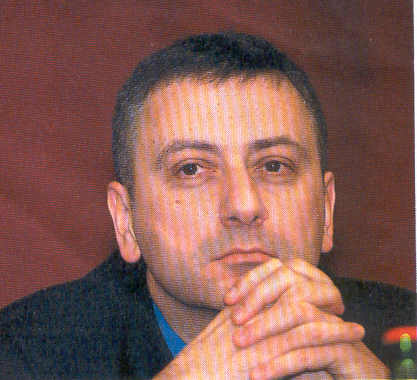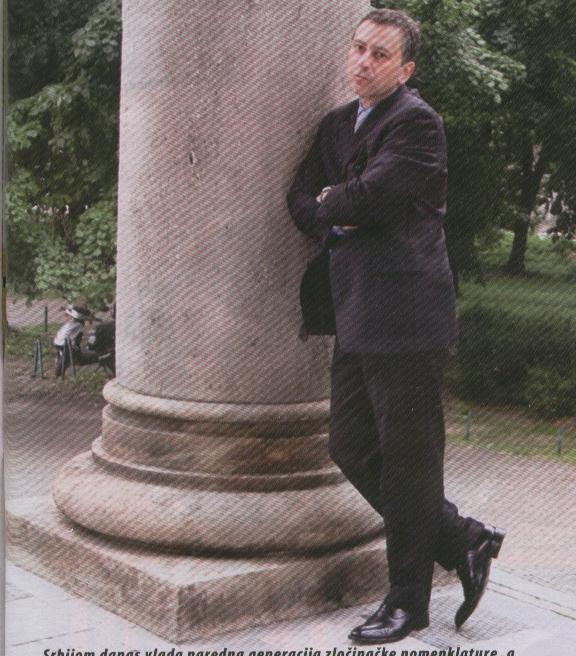Serbia: a cold civil war
by Nikola Samardžic - interviewed by Start (Sarajevo)

Start: What in your view will be the effect of Slobodan Milošević’s death on the political situation in Serbia? Will it lead to a radicalization?
Samardžić: The murder of prime minister Zoran Dinđić three years ago already ushered in a general political, cultural and ideological regression, which was consolidated with the election of Vojislav Koštunica’s government. The latter’s cabinet ran a media campaign that politically endorsed the assassination. Those who had planned and organized the assassination included mafia and military leaders, war profiteers and war criminals, a few notorious academics, professional sports associations, and journalistic thugs from the army and state security organs. In fact all those who saw in Koštunica an opportunity to end reforms and Serbia’s cooperation with The Hague. The impression that Milošević still rules - albeit from the other world - is not an empty metaphor. Koštunica is the protector of the killers of Vukovar, Dubrovnik, Sarajevo and Srebrenica, as well as of the Serbian urban class.
The Radicals feed on the weakness and fear of the opposition, on national frustration and poverty-induced traumas, and on a generalized primitivism engendered by a government that has revived the memory of the greatest mass killer in Europe’s postwar history, a man who died dreaming of Serbia as the last remaining member of the Eastern bloc, of Serbia as a new Gulag fenced in with a new Berlin Wall built on state terrorism and self-isolation.
Milošević’s commemoration coincided with that of Đinđić. Whose policies would win if elections were held today?
This is not a matter of simple arithmetic. It is an open question whether, five years after 5 October, Serbian citizens, and especially the new voters, are aware of the dimensions of the cataclysm that Serbia inflicted upon its neighbours - and also upon itself. One must remember that Milošević fell only by a whisker on 5 October. Koštunica, who shares Milošević’s values, proved an acceptable option for the EU and US friends of the opposition. As a result there is an eerie sense of equilibrium in Serbia today.
What about the opposition?
There is none, for everyone partakes of government at some level. The absence of a clear separation between government and opposition, i.e. the existing confusion regarding democratic values and Serbia’s European path, indicates a need for new people to enter politics. The Serbian Renewal Movement and G17, who are part of the governmental coalition, are at times more convincing opponents of Koštunica and the Radicals than the Democratic Party of Serbia and its leader Boris Tadić, who are formally in opposition. This is true especially in regard to Milošević’s inheritance and the issues of The Hague, Kosovo and Montenegro. In this context the Liberal Democratic Party appears extremist in its critique of the government and the dominant system of values.
How strongly pro-European was the political option advocated by Zoran Đindić?
Three years have passed, a small political epoch, since his death. Đinđić was obstructed also by ministers in his own government. He did not have enough time, nor was he able, to mend all the holes through which were seeping the last fluids of an accursed country: a country which, having decided that his murder had possibly wasted its last chance, desecrated his inheritance at the very end of that same year in one of the perhaps most morally base elections in recent political history. Instead of the year 2000 being the start of a new epoch, new democratic forces are once again forced to assemble from scratch, promising - I hope in a not too distant future - the arrival of a happy and prosperous Serbia. But this process is only at its beginning.
It might be argued that while the opposition to Milošević enjoyed the advantage of having a concrete target, i.e. removing Milošević from power, those who have remained faithful to Đinđić’s programme do not face such a clearly defined enemy. Would you agree? Has Serbia definitively rejected Đinđić’s course?
If Milošević’s death does lead to radicalization, one may expect also a strengthening of resistance to it. The differentiation between the democratic and the authoritarian, the liberal and the conservative Serbia may not appear so sharp this time round; but in contrast to the coalition of 5 October it will be more fundamental. During the past five years the course of reform has been uneven. The banking and monetary sectors have led the way, while resistance to and doubts about privatization remain. They were present also in Đinđić time. Nothing has been done about denationalization and restitution of property. The exception is Milošević’s decision to return to the Church part of its possessions. Hesitation in regard to privatization does not derive solely from sectional interests; it also highlights the ideological origins of the ruling elite, i.e. its emergence from the old Communist nomenklatura.
Do you think that Milošević died a natural death?
I don’t believe that Milan Babić died a natural death. I believe that he was murdered by the anti-Hague lobby, the same one that organized Đinđić’s assassination. Babić’s testimony threatened Milošević, Š ešelj, Jovica Stanišić, etc., as well as many others who have not been indicted. Milošević was trying to make himself temporarily more ill, in order to be transferred to Moscow for treatment. Moscow has become the place of refuge for war criminals and war profiteers.
Some commentators have argued that Milošević’s death has removed only the executor of a policy, while leaving its ideologues to remain politically active. They have in mind the authors of the SANU Memorandum, which they insist provided the ideological basis for the wars in the former Yugoslavia. Will such people ever be made to account for what they did, and if so to whom?
Milošević has come to personify that policy, but though he was doubtless most responsible for it the ideologues naturally should not be overlooked. It is not realistic to expect that Serbia will be able to rid itself of this criminal inheritance solely through its own efforts. The court at Nuremberg took eleven months to condemn some twenty Nazis, people who had committed the greatest crime in human history, and caused an international war - which they almost won. By contrast the court at The Hague failed after over four years to convict one comparatively petty local leader. As a result Koštunica’s media tell us that Milošević was not guilty, because he was not found guilty. They pass in silence over the fact that Hitler and Mussolini died without being put on trial, and that Stalin and Pol Pot died natural deaths.
There are those who argue that, in addition to generals and politicians, academicians like Ćosić should also be charged by the court in The Hague. Do you think his responsibility is of that nature?
It is not clear why the case against Milosević includes references to the Memorandum, while its authors have de facto been amnestied. The Memorandum, which called for violence, is not so important in my view, however. More important in this context is Dobrica Ćosić’s role as president of FRY in 1992, when well organized and coordinated attacks on Bosniaks in the Sandžak took place. This happened only during his presidency. And there is also the fact that no call has been made for banning the Socialist and Radical parties: parties whose leaders have been charged with the gravest war crimes, such as infringement of humanitarian law and the rules of war, and even the crime of genocide. Since Serbian society appears unable to do this itself, it is the duty of the Council of Europe, the EU, the USA and the UN to initiate and, if possible, complete this process.
How, in your view, will Milošević’s death affect Bosnia-Herzegovina?
Negative developments in Serbia cannot but have negative consequences for Bosnia-Herzegovina. Relations between the two countries remain at a low ebb; this trend will most likely continue as a result of the political regression in Serbia caused by Milošević’s death. This is due not only to the fact that Milošević’s party is supporting Koštunica, but also to the character of the prime minister and his party, the DSS. Koštunica is protecting Mladić, whose surrender to The Hague is difficult to imagine at this moment. Koštunica is pretending that Milošević’s death makes this impossible right now. The truth is that he has resurrected the criminal league that three years ago murdered Đinđić and is today busy destroying Serbia’s European future, i.e. its ability to become a happy and prosperous community. The assumption that this process no longer poses a threat to Serbia’s neighbours, by contrast with the 1990s, is faulty because of the continuing power of the army, the police, the Church and organized crime. This means that the European, democratic and liberal Serbia has the duty to clearly define the future, and to start treating its Euro-Atlantic allies as foreign partners in a process of defence of values that it holds dear. Our Liberal Democratic Party will be a partner to all democrats in Serbia. We shall if need be take once again to the streets, this time in order to remove Milošević’s rule from the other world.
Serbia is confronted with several difficult questions: Kosovo, Montenegro, the surrender of Mladić to The Hague, the genocide case brought before the ICJ by Bosnia-Herzegovina. Will it be able to grapple with them all?
The Liberal Democratic Party is so far the only serious political party that calls for recognition of the independence of Kosovo and Montenegro, which those two countries desire. The responsibility of politicians is not simply to accept reality, but also to show the good will to recognize the rights and freedoms of communities that are being denied such rights and freedoms. The majority of Serbian politicians believe that a policy of truth and responsibility amounts right now to self-destruction. I believe that the opposite is true: that its general crisis of values, its flirting with anachronistic ideas and collective identities, has made Serbia once again into a pitiful and shameful object of international relations that are being created for the purpose of politically stabilizing this area and drawing our societies closer to European values and standards.
How do you see the outcome of the problems mentioned above?
Those who are determined to continue to live in Serbia and are fighting for its profound transformation could be seen as incorrigible optimists. At this moment Serbia’s future depends also on the good will of precisely those neighbours on which Serbia has recently inflicted so much human calamity and material destruction. It is possible that our neighbours will find it in their interest to accept my country with all its illusions and paradoxes.
 Nikola Samardžić is professor of modern and contemporary history at the University of Belgrade. He is also one of the closest collaborators of Liberal Democratic Party leader Čedomir Jovanović. Nikola Samardžić’s late father, the historian Radovan Samardžić, was a member of the commission that produced the infamous Memorandum of the Serbian Academy of Arts and Science (SANU), which in 1986 sought to justify in advance Serbia’s war against its neighbours. This translation is from an interview with the Sarajevo weekly Start, 21 March 2006. Nikola Samardžić is professor of modern and contemporary history at the University of Belgrade. He is also one of the closest collaborators of Liberal Democratic Party leader Čedomir Jovanović. Nikola Samardžić’s late father, the historian Radovan Samardžić, was a member of the commission that produced the infamous Memorandum of the Serbian Academy of Arts and Science (SANU), which in 1986 sought to justify in advance Serbia’s war against its neighbours. This translation is from an interview with the Sarajevo weekly Start, 21 March 2006.
|